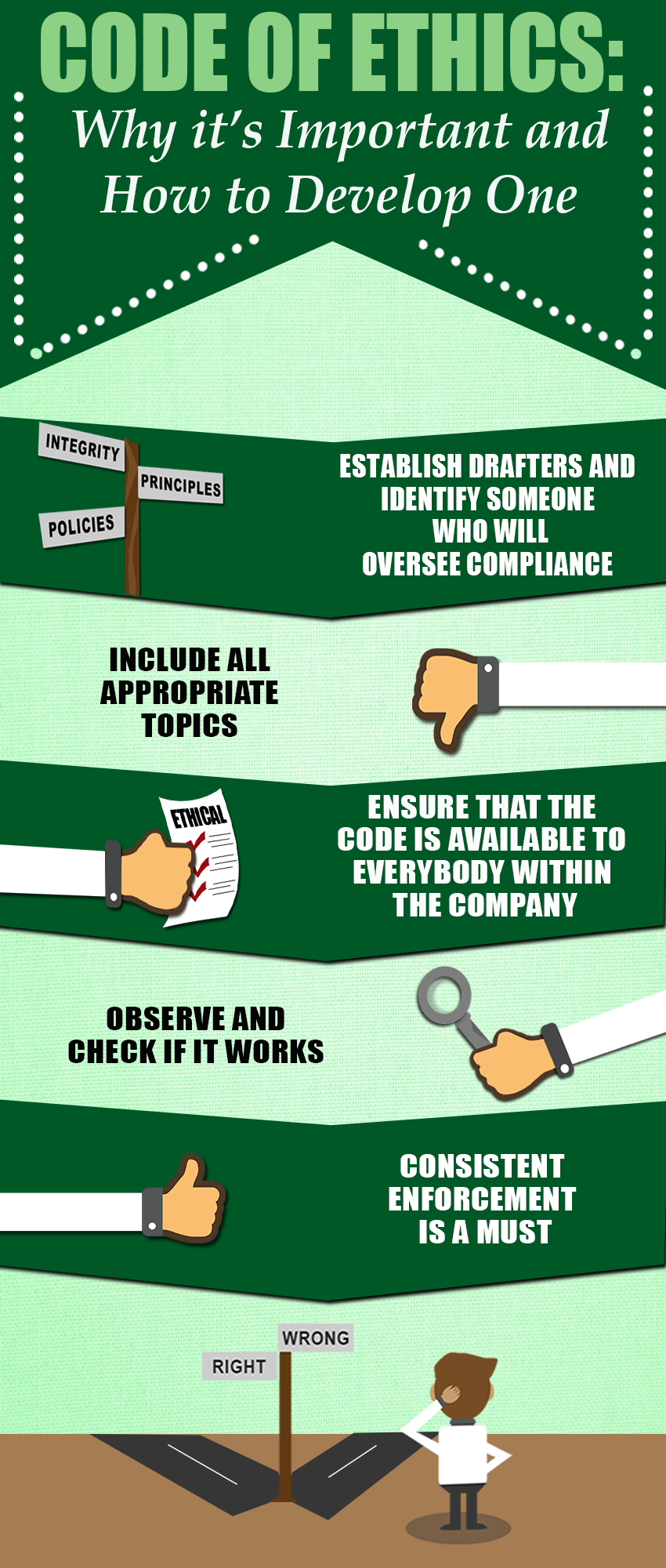Most, if not all, professional organizations have their own code of ethics. This is significant because it is a statement of said organization’s values and standards for acceptable and proper behavior. It is now strange to think that before the 2002 passage of the Sarbanes-Oxley Act, a landmark anti-fraud law, not every company had their own code of business conduct.
Well times have changed and today, it is an absolute must. The trick now is to come up with a code that adequately defines you and your company. It doesn’t just involve sitting around and coming up with a few ideas on how it would work and what wouldn’t. There are considerable ways to develop your company’s code of ethics and here are a few tips that can make the effort as smooth and effective as possible.
Steps to Creating a Company’s Code of Ethics

ESTABLISH DRAFTERS AND IDENTIFY SOMEONE WHO WILL OVERSEE COMPLIANCE
Codes of business ethics are often drafted by in-house counsel with input from a multi-disciplinary team. Such a team may include senior management and representatives from safety, communications, human resources, marketing, and various other relevant departments within the organization. In some cases, outside counsel may even get involved.
A team that represents the various components of the company ensures that the code responds to any and all necessary risk areas and accounts for the differences across the departments. Besides the team, it is also important to identify someone who can oversee compliance with the code after it has been finalized and properly implemented.
INCLUDE ALL APPROPRIATE TOPICS
A company’s code of ethics is a reflection on their identity; what they stand for in terms of values and practices must be clearly defined. A reference or two to outside codes might serve as a good starting point, but your own code must be tailor made to your company’s industry, values, and culture. With that in mind, particular topics have to be included.
Relevant topics include business records, bribery, confidentiality, discrimination, harassment, fraud, and the like. Other topics should include guidelines that relate to the reporting of code violations. Safety should be a priority in the workplace and should address issues such as workplace violence, alcohol and drug abuse, crisis management, privacy, and respect for diversity.
ENSURE THAT THE CODE IS AVAILABLE TO EVERYBODY WITHIN THE COMPANY
Something as important as this should be well known to everybody, not just the higher ups. Everybody from the middle managers to regular employees to the interns must be well aware and there are various ways to let them all know. It can be disseminated as a printed document or can be sent out in the form of an online posting. Placing the code of ethics online is also a great idea since it allows for future changes and revisions to take place minus the reprinting that inevitably comes with the paper versions.
OBSERVE AND CHECK IF IT WORKS
Once the creation and development of the code has been completed, it is now up to the company to enforce it and to check how it holds up. Are there any major flaws? Will there be any necessary revisions, and if so, when and how shall it be implemented? Ensuring that the developed code works is essential due to the slew of potential problems that will arise in its absence.
A newly implemented code of business ethics will take some time to reveal whether or not it is working properly. Over time, organizations should utilize monitoring and regular audits to be able to determine if a code is having the intended effect. Such tools can also be part of a program that can find out if the company’s employees are consistently complying with the code. In this way, it can also be determined whether or not the disciplinary and reporting mechanisms are just as effective.
CONSISTENT ENFORCEMENT IS A MUST
Essential to a code’s credibility would be its enforcement. Think about it: if no disciplinary action is taken upon violations, then employees are less likely to adhere or even pay attention to the code. Every violation should have an appropriate and reasonable sanction. Companies need to take care and make sure that discipline is consistent across the board, based on the gravity of the offense rather than the offender’s rank or position within the company.
Minor infractions may include frequent tardiness, minor acts of insubordination, abuse of office equipment, and so on. Minor penalties may be resolved with warnings, both oral and written. Reduced job privileges may also take effect. Concerning major code breaches, harsher penalties would be needed. Acts of violence, theft, and abuse of power are all common examples. Punishments may include demotions, pay reductions, and even termination in some of the more extreme cases.
